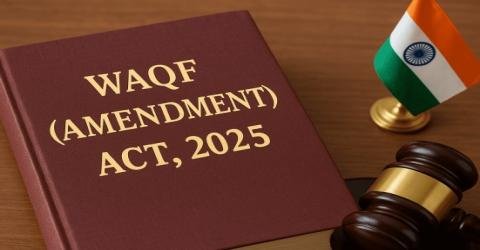Is the Waqf Amendment Act, 2025 of India Unconstitutional?
The Waqf (Amendment) Act, 2025, passed by the Indian Parliament and enacted on April 8, 2025, has sparked intense debate across political, legal, and social spheres. The legislation, which amends the Waqf Act of 1995, aims to reform the management and administration of waqf properties—Islamic endowments dedicated for religious or charitable purposes. However, its provisions have been met with significant opposition, with critics labeling it unconstitutional and an infringement on religious autonomy. As the Supreme Court prepares to hear challenges to the law on April 16, 2025, the question looms: Does the Waqf Amendment Act, 2025 violate India’s constitutional framework?
Background of the Waqf Amendment Act, 2025
The Waqf Act of 1995 governs the administration of waqf properties in India, managed by Waqf Boards under state and central oversight. Waqf properties, dedicated in perpetuity for religious or charitable purposes under Islamic law, are significant in scale, with estimates suggesting over 8.7 lakh properties spanning millions of acres across India. The 2025 amendment introduces several changes to this framework, with the stated goal of enhancing transparency, accountability, and efficiency in waqf management.
Key provisions of the Waqf Amendment Act, 2025 include:
Inclusion of Non-Muslims in Waqf Governance: The Act mandates the inclusion of two non-Muslim members in the Central Waqf Council and State Waqf Boards, a move critics argue dilutes the religious character of waqf administration.
Elimination of ‘Waqf by User’: The concept of recognizing waqf properties based on long-term use without formal documentation has been removed, raising concerns about the status of historical waqfs.
Enhanced State Control: The Act empowers District Collectors to resolve disputes over waqf properties, transferring authority from Waqf Boards to state revenue mechanisms.
Five-Year Muslim Practice Clause: A new requirement stipulates that only individuals who have practiced Islam for at least five years can create a waqf, prompting questions about its enforceability and fairness.
Changes to Waqf Tribunals: The tribunal structure no longer requires a Muslim law expert, and appeals can now proceed to High Courts, altering the judicial process for waqf disputes.
Mandatory Registration and Digitization: All waqf properties must be registered within six months, with details uploaded to a centralized portal, creating logistical challenges for smaller or undocumented waqfs.
The government, led by the Bharatiya Janata Party (BJP), defends the law as a “historic reform” aimed at curbing mismanagement and ensuring benefits reach marginalized Muslim communities, particularly women and children. Prime Minister Narendra Modi, speaking at the Rising Bharat Summit 2025, called it a “step towards social justice” for poor and Pasmanda Muslims. However, opposition parties, Muslim organizations, and legal experts have raised alarms, arguing that the Act infringes on constitutional protections and targets the Muslim community.
Constitutional Concerns: The Core Arguments
The constitutionality of the Waqf Amendment Act, 2025 hinges on several provisions of the Indian Constitution, particularly Articles 14, 15, 25, 26, and 300A. Critics, including the All India Muslim Personal Law Board (AIMPLB), the Indian Union Muslim League (IUML), and opposition leaders like Asaduddin Owaisi, have filed over 10 petitions in the Supreme Court, challenging the law on the following grounds:
1. Violation of Religious Freedom (Articles 25 and 26)
Article 25 guarantees the right to freely practice, profess, and propagate religion, while Article 26 grants religious communities the right to manage their own affairs, establish institutions, and administer properties in accordance with their beliefs. Critics argue that the inclusion of non-Muslims in Waqf Boards and the Central Waqf Council undermines the Muslim community’s autonomy to manage waqf properties, which are inherently religious in nature.
The IUML’s petition describes the Act as an “unconstitutional assault on the religious autonomy and personal rights of the Muslim community,” contending that waqf, as a concept rooted in Islamic law, should be governed exclusively by Muslims. The removal of the requirement for a Muslim law expert in tribunals and the transfer of dispute resolution to District Collectors—often non-Muslims—are seen as further encroachments on religious self-governance.
The government counters that waqf properties are not solely religious but serve broader charitable purposes, justifying state intervention to ensure transparency. It cites consultations with diverse stakeholders and support from non-Muslim minorities as evidence of the law’s inclusive intent.
2. Discrimination and Equality (Articles 14 and 15)
Article 14 ensures equality before the law, while Article 15 prohibits discrimination on grounds of religion, race, caste, sex, or place of birth. The five-year Muslim practice clause has drawn particular scrutiny, with critics like Trinamool Congress MP Nadimul Haque questioning who would certify an individual’s religious practice. This provision, they argue, is arbitrary and discriminatory, violating Article 14’s guarantee of equal treatment.
Additionally, petitioners like the Samajwadi Party and DMK claim the Act disproportionately targets Muslims, noting that no similar restrictions exist for Hindu endowments or other religious trusts. The enhanced role of state authorities, particularly District Collectors, is seen as favoring state control over Muslim properties, potentially breaching Article 15’s anti-discrimination mandate.
The government argues that the clause ensures genuine intent in waqf creation, preventing misuse by non-practicing individuals. It also emphasizes that the law applies uniformly to all waqf properties, regardless of the creator’s background, thus complying with equality principles.
3. Property Rights (Article 300A)
Article 300A protects individuals from being deprived of property except by due process. Petitioners contend that the Act’s provisions—such as the elimination of ‘waqf by user’ and mandatory registration within a tight six-month window—jeopardize the status of historical waqfs, many of which lack formal deeds. The transfer of authority to District Collectors to determine waqf status, bypassing Waqf Boards, is seen as undermining property rights, potentially leading to reclassification of waqf land as government property.
The Jamiat Ulama-i-Hind’s petition warns that these changes could render “several waqf properties vulnerable,” threatening their existence. The government, however, asserts that the Act clarifies ownership, ensuring government-owned land mistakenly recorded as waqf is corrected, thus protecting public assets.
4. Federalism and Legislative Competence
Some petitioners, including the DMK, argue that the Act oversteps Parliament’s legislative competence by encroaching on states’ rights to manage religious endowments, a subject under the Concurrent List. The enhanced role of state-appointed officials like District Collectors is seen as disrupting the balance between central and state authority, particularly in states like Tamil Nadu, where resolutions opposing the Act have been passed.
The Centre defends its authority, citing the Waqf Act’s long-standing status as a central law and the need for uniform reforms to address mismanagement nationwide.
The Government’s Defense: Transparency and Social Justice
The BJP-led government insists that the Waqf Amendment Act, 2025 is not anti-Muslim but a corrective measure to address decades of mismanagement. Union Minority Affairs Minister Kiren Rijiju has highlighted irregularities in Waqf Boards, claiming the amendments ensure accountability and benefit marginalized Muslims. The inclusion of non-Muslims, the government argues, promotes diversity and checks potential biases within Boards.
The Act’s digitization mandate aims to create a transparent database, reducing disputes and illegal encroachments. Provisions for penal action against mismanagement and representation from donor families in local committees are presented as empowering grassroots stakeholders. The government also points to the 17-hour Rajya Sabha debate—the longest in the Upper House’s history—as evidence of thorough deliberation, despite opposition claims of inadequate consultation.
Public and Political Reactions
The Act has polarized public opinion. Protests erupted in cities like Hyderabad, Kolkata, and Manipur, with Muslim organizations like the AIMPLB and Darsgah-Jihad-O-Shahadat denouncing it as a “black law.” Political parties, including Congress, DMK, Samajwadi Party, and National Conference, have labeled it unconstitutional, with leaders like Farooq Abdullah and Rahul Gandhi criticizing its impact on minority rights. Conversely, BJP allies and some community voices have welcomed the reforms, citing benefits for transparency and inclusivity.
The Road Ahead: Supreme Court’s Role
The Supreme Court’s hearing on April 16, 2025, before a three-judge bench led by Chief Justice Sanjiv Khanna, will be pivotal. With over 10 petitions challenging the Act, the court will assess whether its provisions violate fundamental rights or fall within the state’s regulatory powers. The Centre’s caveat, seeking to be heard before any orders, underscores the high stakes.
Legal experts suggest the court may focus on balancing religious autonomy with the state’s interest in regulating public assets. Precedents like the Supreme Court’s ruling on religious property rights and the Ramjanmabhumi-Babri Masjid case, which recognized ‘waqf by user,’ could influence the outcome. An interim stay, as sought by petitioners, could pause the Act’s enforcement, but the court’s reluctance to grant urgent hearings suggests a measured approach.
Conclusion: A Constitutional Tightrope
The Waqf Amendment Act, 2025 navigates a complex interplay of religious freedom, equality, and state authority. While the government frames it as a reform for transparency and social justice, critics see it as an overreach that undermines Muslim autonomy and constitutional protections. Whether the Act is unconstitutional will depend on the Supreme Court’s interpretation of its impact on Articles 14, 15, 25, 26, and 300A.
As India awaits the judiciary’s verdict, the debate underscores deeper tensions about secularism, minority rights, and the state’s role in religious affairs. The outcome will not only shape the future of waqf properties but also set a precedent for how India balances diversity with governance in a polarized landscape.
Sources:
The Hindu, “Petitions Challenging Waqf Amendment Act, 2025 Listed for Hearing”
Business Standard, “Supreme Court to Hear Pleas Challenging Waqf Act on April 16”
NDTV, “Waqf Act Comes Into Force, Top Court to Hear Pleas”
LiveLaw, “IUML Moves Supreme Court Challenging Waqf Amendment Act”
India Today, “Why New Waqf Law Has 5-Year Muslim Clause”
Posts on X reflecting public and political sentiment






